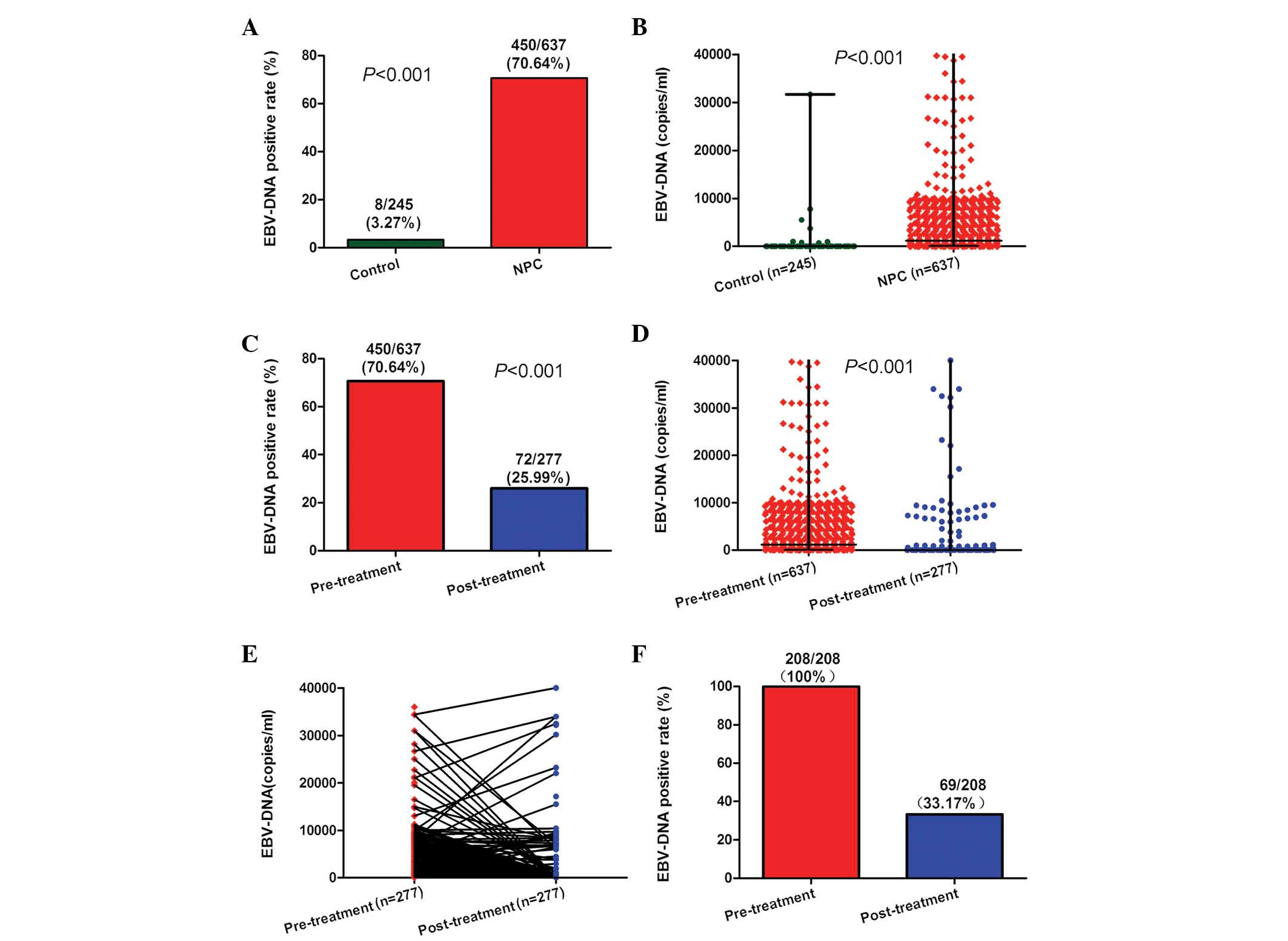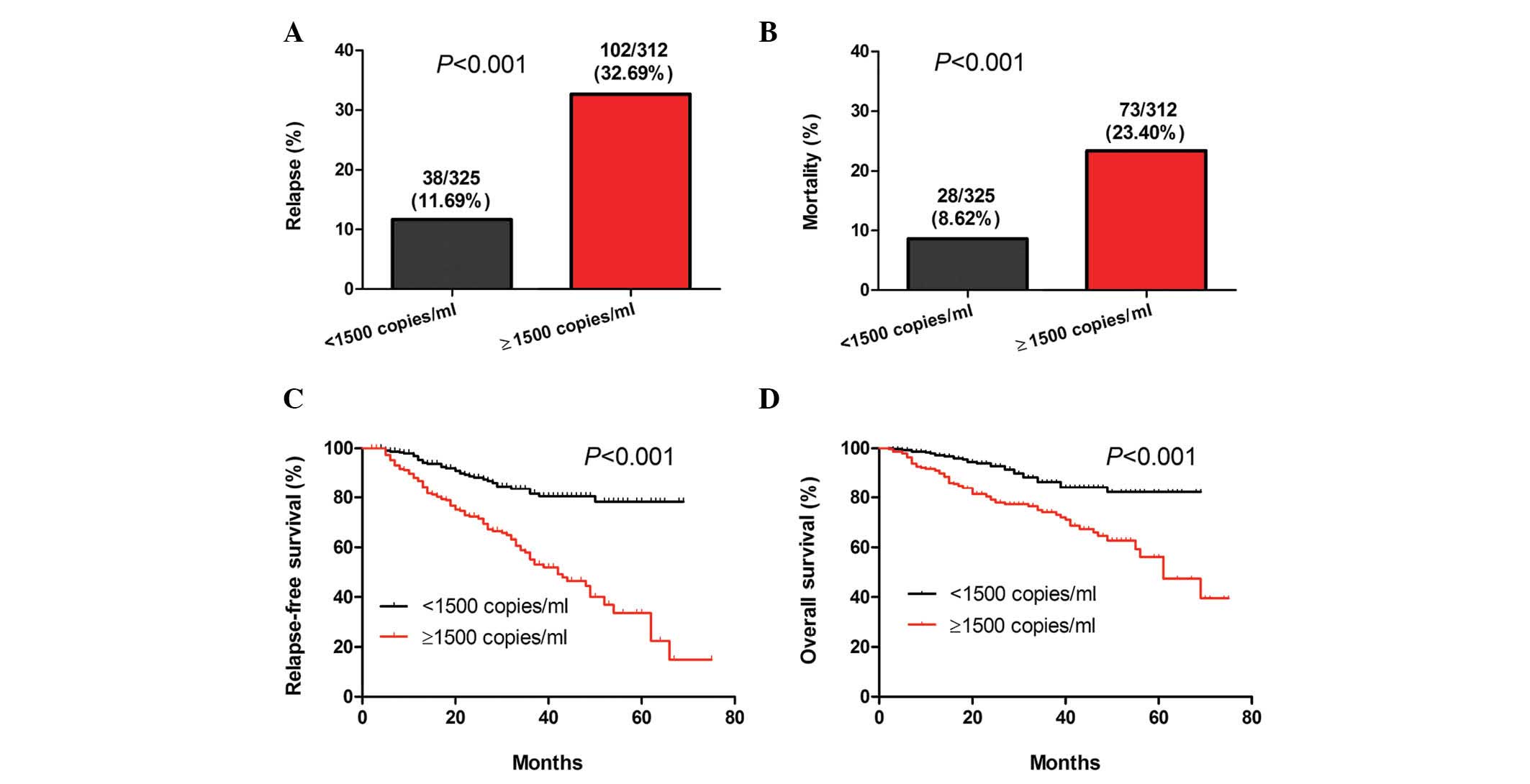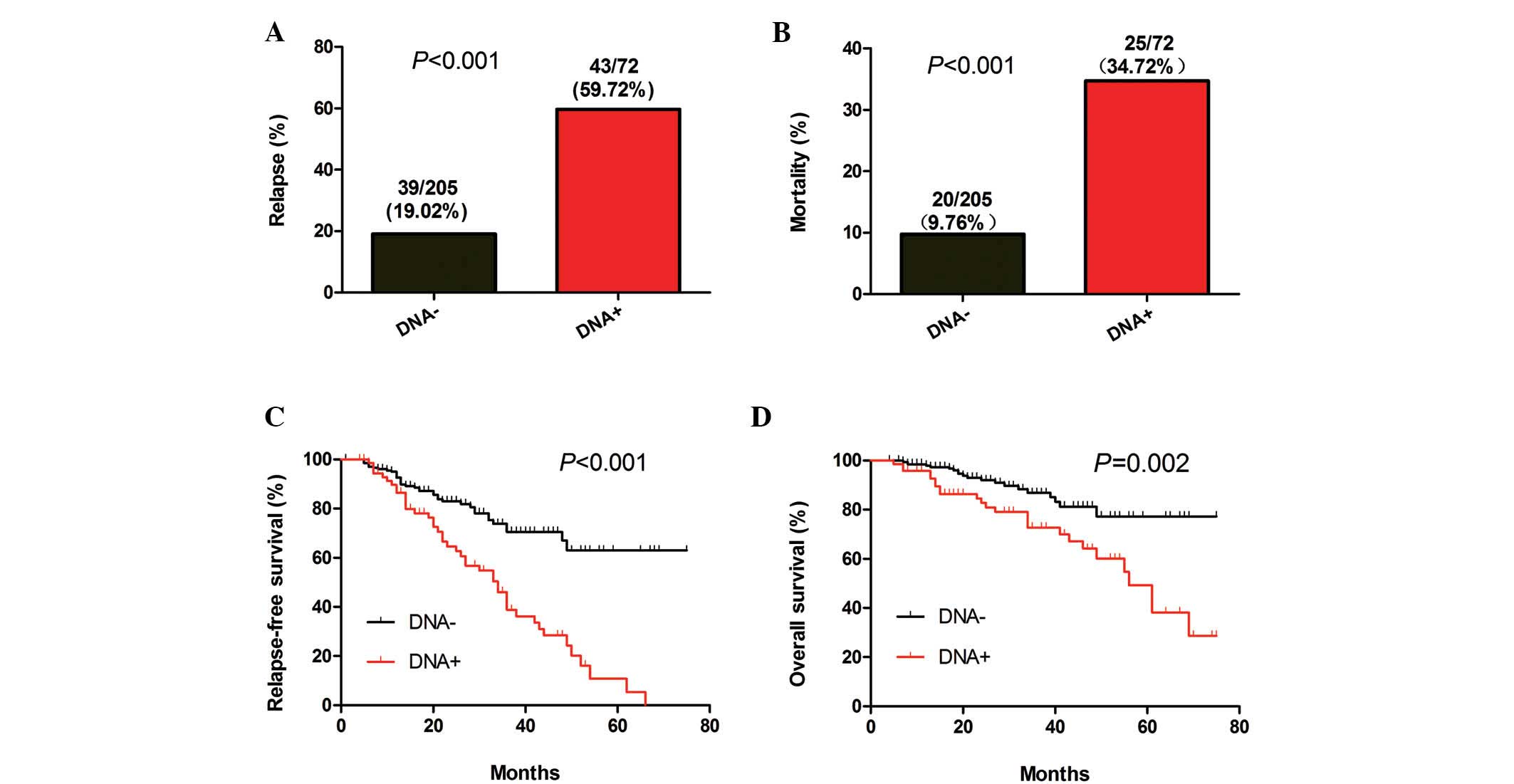|
1
|
Wei WI and Sham JS: Nasopharyngeal
carcinoma. Lancet. 365:2041–2054. 2005. View Article : Google Scholar : PubMed/NCBI
|
|
2
|
Lee N, Xia P, Quivey JM, et al:
Intensity-modulated radiotherapy in the treatment of nasopharyngeal
carcinoma: An update of the UCSF experience. Int J Radiat Oncol
Biol Phys. 53:12–22. 2002. View Article : Google Scholar : PubMed/NCBI
|
|
3
|
Lin JC, Jan JS, Hsu CY, Liang WM, Jiang RS
and Wang WY: Phase III study of concurrent chemoradiotherapy versus
radiotherapy alone for advanced nasopharyngeal carcinoma: Positive
effect on overall and progression-free survival. J Clin Oncol.
21:631–637. 2003. View Article : Google Scholar : PubMed/NCBI
|
|
4
|
Lee AW, Sze WM, Au JS, et al: Treatment
results for nasopharyngeal carcinoma in the modern era: The Hong
Kong experience. Int J Radiat Oncol Biol Phys. 61:1107–1116. 2005.
View Article : Google Scholar : PubMed/NCBI
|
|
5
|
Chang YS, Tyan YS, Liu ST, Tsai MS and Pao
CC: Detection of Epstein-Barr virus DNA sequences in nasopharyngeal
carcinoma cells by enzymatic DNA amplification. J Clin Microbiol.
28:2398–2402. 1990.PubMed/NCBI
|
|
6
|
Pathmanathan R, Prasad U, Chandrika G,
Sadler R, Flynn K and Raab-Traub N: Undifferentiated,
nonkeratinizing and squamous cell carcinoma of the nasopharynx.
Variants of Epstein-Barr virus-infected neoplasia. Am J Pathol.
146:1355–1367. 1995.PubMed/NCBI
|
|
7
|
Lo YM, Chan LY, Lo KW, et al: Quantitative
analysis of cell-free Epstein-Barr virus DNA in plasma of patients
with nasopharyngeal carcinoma. Cancer Res. 59:1188–1191.
1999.PubMed/NCBI
|
|
8
|
Chan AT, Lo YM, Zee B, et al: Plasma
Epstein-Barr virus DNA and residual disease after radiotherapy for
undifferentiated nasopharyngeal carcinoma. J Natl Cancer Inst.
94:1614–1619. 2002. View Article : Google Scholar : PubMed/NCBI
|
|
9
|
Adham M, Greijer AE, Verkuijlen SA, et al:
Epstein-Barr virus DNA load in nasopharyngeal brushings and whole
blood in nasopharyngeal carcinoma patients before and after
treatment. Clin Cancer Res. 19:2175–2186. 2013. View Article : Google Scholar : PubMed/NCBI
|
|
10
|
Chan KC, Hung EC, Woo JK, et al: Early
detection of nasopharyngeal carcinoma by plasma Epstein-Barr virus
DNA analysis in a surveillance program. Cancer. 119:1838–1844.
2013. View Article : Google Scholar : PubMed/NCBI
|
|
11
|
Lin JC, Wang WY, Chen KY, et al:
Quantification of plasma Epstein-Barr virus DNA in patients with
advanced nasopharyngeal carcinoma. N Engl J Med. 350:2461–2470.
2004. View Article : Google Scholar : PubMed/NCBI
|
|
12
|
Wang WY, Twu CW, Chen HH, et al: Plasma
EBV DNA clearance rate as a novel prognostic marker for
metastatic/recurrent nasopharyngeal carcinoma. Clin Cancer Res.
16:1016–1024. 2010. View Article : Google Scholar : PubMed/NCBI
|
|
13
|
Wang WY, Twu CW, Chen HH, et al: Long-term
survival analysis of nasopharyngeal carcinoma by plasma
Epstein-Barr virus DNA levels. Cancer. 119:963–970. 2013.
View Article : Google Scholar : PubMed/NCBI
|
|
14
|
Fan H, Nicholls J, Chua D, et al:
Laboratory markers of tumor burden in nasopharyngeal carcinoma: A
comparison of viral load and serologic tests for Epstein-Barr
virus. Int J Cancer. 112:1036–1041. 2004. View Article : Google Scholar : PubMed/NCBI
|
|
15
|
Chan KC, Chan AT, Leung SF, et al:
Investigation into the origin and tumoral mass correlation of
plasma Epstein-Barr virus DNA in nasopharyngeal carcinoma. Clin
Chem. 51:2192–2195. 2005. View Article : Google Scholar : PubMed/NCBI
|
|
16
|
Hsu CL, Chang KP, Lin CY, et al: Plasma
Epstein-Barr virus DNA concentration and clearance rate as novel
prognostic factors for metastatic nasopharyngeal carcinoma. Head
Neck. 34:1064–1070. 2012. View Article : Google Scholar : PubMed/NCBI
|
|
17
|
Lo YM, Leung SF, Chan LY, et al: Kinetics
of plasma Epstein-Barr virus DNA during radiation therapy for
nasopharyngeal carcinoma. Cancer Res. 60:2351–2355. 2000.PubMed/NCBI
|
|
18
|
To EW, Chan KC, Leung SF, et al: Rapid
clearance of plasma Epstein-Barr virus DNA after surgical treatment
of nasopharyngeal carcinoma. Clin Cancer Res. 9:3254–3259.
2003.PubMed/NCBI
|
|
19
|
Leung SF, Chan AT, Zee B, et al:
Pretherapy quantitative measurement of circulating Epstein-Barr
virus DNA is predictive of posttherapy distant failure in patients
with early-stage nasopharyngeal carcinoma of undifferentiated type.
Cancer. 98:288–291. 2003. View Article : Google Scholar : PubMed/NCBI
|
|
20
|
Ferrari D, Codecà C, Bertuzzi C, et al:
Role of plasma EBV DNA levels in predicting recurrence of
nasopharyngeal carcinoma in a Western population. BMC Cancer.
12:2082012. View Article : Google Scholar : PubMed/NCBI
|
|
21
|
Chan JY and Wong ST: The role of plasma
Epstein-Barr virus DNA in the management of recurrent
nasopharyngeal carcinoma. Laryngoscope. 124:126–130. 2014.
View Article : Google Scholar : PubMed/NCBI
|
|
22
|
Edge SB, Byrd DR, Compton CC, et al:
PharynxAJCC Cancer Staging Manual. 7th. Springer-Verlag; New York,
NY: pp. 422009
|
|
23
|
Yip TT, Ngan RK, Fong AH and Law SC:
Application of circulating plasma/serum EBV DNA in the clinical
management of nasopharyngeal carcinoma. Oral Oncol. 50:527–538.
2014. View Article : Google Scholar : PubMed/NCBI
|
|
24
|
Chien YC, Chen JY, Liu MY, et al:
Serologic markers of Epstein-Barr virus infection and
nasopharyngeal carcinoma in Taiwanese men. N Engl J Med.
345:1877–1882. 2001. View Article : Google Scholar : PubMed/NCBI
|
|
25
|
Cao SM, Liu Z, Jia WH, et al: Fluctuations
of Epstein-Barr virus serological antibodies and risk for
nasopharyngeal carcinoma: A prospective screening study with a
20-year follow-up. PLoS One. 6:e191002011. View Article : Google Scholar : PubMed/NCBI
|
|
26
|
Ji MF, Wang DK, Yu YL, et al: Sustained
elevation of Epstein-Barr virus antibody levels preceding clinical
onset of nasopharyngeal carcinoma. Br J Cancer. 96:623–630. 2007.
View Article : Google Scholar : PubMed/NCBI
|
|
27
|
Cai YL, Li J, Lu AY, et al: Prognostic
significance of serum anti-Epstein-Barr virus antibodies in
nasopharyngeal carcinoma. Zhonghua Shi Yan He Lin Chuang Bing Du
Xue Za Zhi. 27:119–122. 2013.(In Chinese). PubMed/NCBI
|
|
28
|
Twu CW, Wang WY, Liang WM, et al:
Comparison of the prognostic impact of serum anti-EBV antibody and
plasma EBV DNA assays in nasopharyngeal carcinoma. Int J Radiat
Oncol Biol Phys. 67:130–137. 2007. View Article : Google Scholar : PubMed/NCBI
|
|
29
|
Lo YM, Leung SF, Chan LY, et al: Plasma
cell-free Epstein-Barr virus DNA quantitation in patients with
nasopharyngeal carcinoma. Correlation with clinical staging. Ann NY
Acad Sci. 906:99–101. 2000. View Article : Google Scholar : PubMed/NCBI
|
|
30
|
Leung SF, Lo YM, Chan AT, et al: Disparity
of sensitivities in detection of radiation-naïve and
postirradiation recurrent nasopharyngeal carcinoma of the
undifferentiated type by quantitative analysis of circulating
Epstein-Barr virus DNA1,2. Clin Cancer Res. 9:3431–3434.
2003.PubMed/NCBI
|
|
31
|
Hou X, Zhao C, Guo Y, et al: Different
clinical significance of pre- and post-treatment plasma
Epstein-Barr virus DNA load in nasopharyngeal carcinoma treated
with radiotherapy. Clin Oncol (R Coll Radiol). 23:128–133. 2011.
View Article : Google Scholar : PubMed/NCBI
|

















